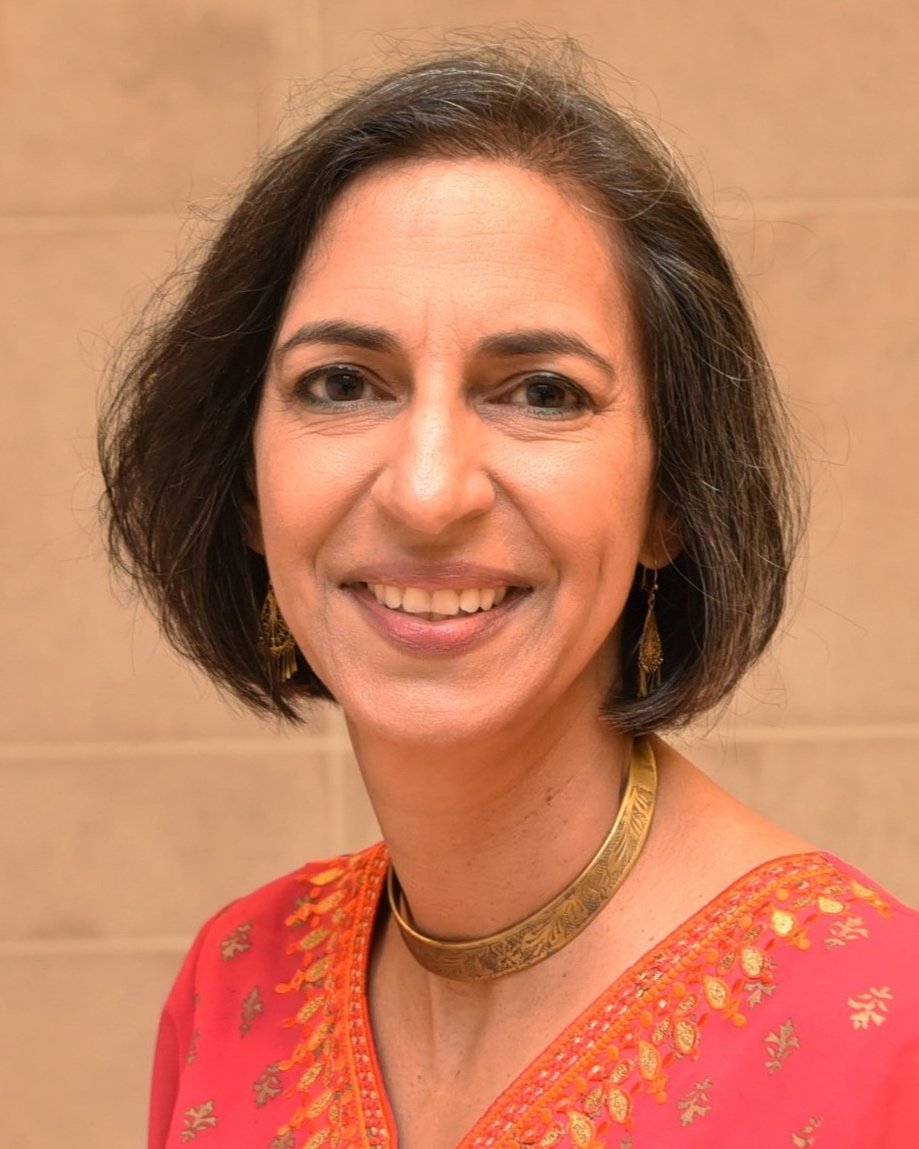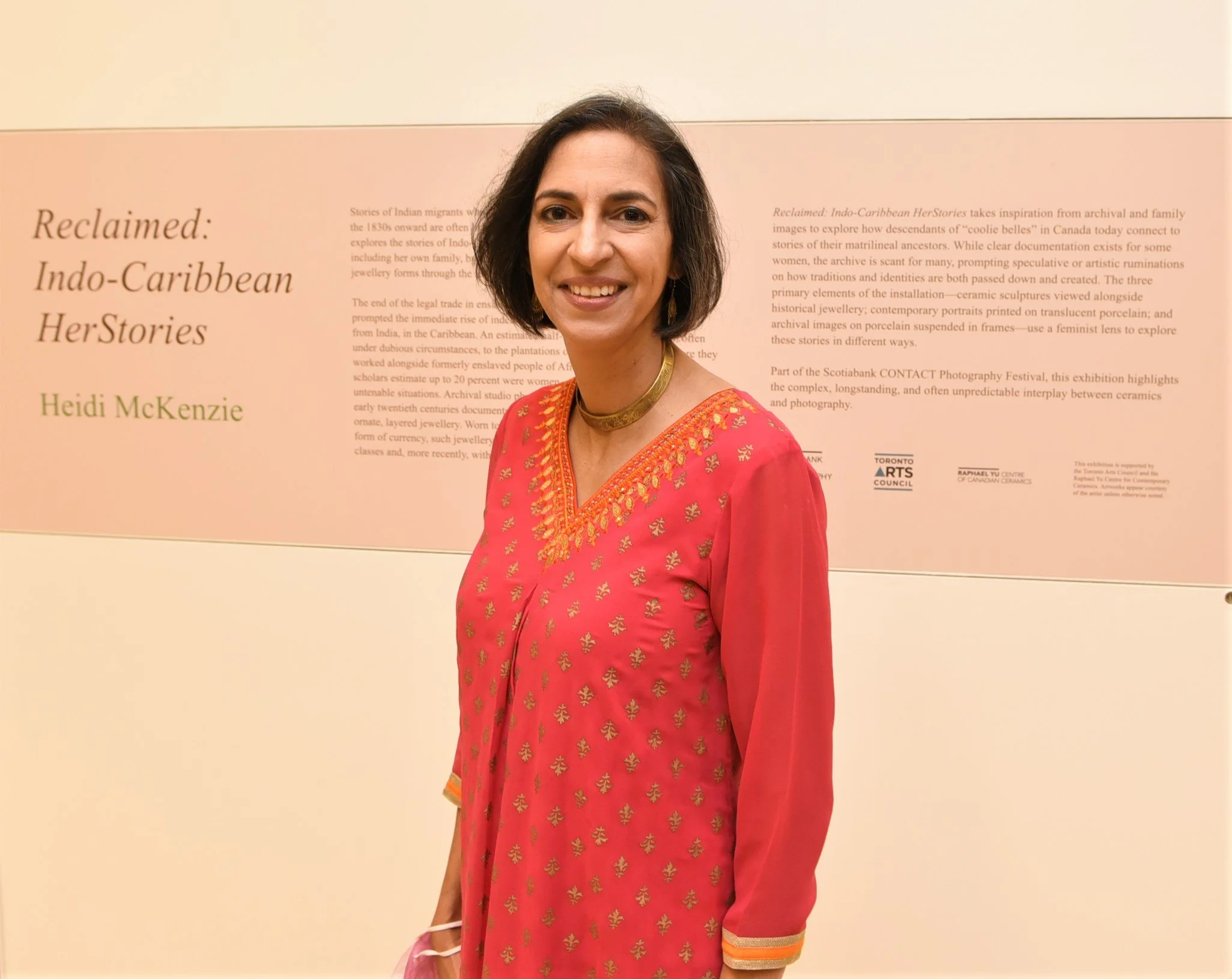Artist Heidi McKenzie's exhibit illuminates Indo-Caribbean women power, strength and courage
May 26, 2023
After migrating from Jamaica to Canada in 1963, Kamala-Jean Gopie found it unusual that people would often inquire about her background.
“I said I was Indian, but their notion of Indian was Aboriginal peoples,” she said. “So, it was very difficult for them to make the connections. I would say people from Italy are Italians, those from China are Chinese and my grandparents and great grandparents came from India and we are Indians. I found that I was betwixt and between because while I view myself as Indo-Caribbean, I have no real close connections to India. Jamaica is primarily a Black nation, so they didn’t have space in their thinking for me.”
Gopie, the Jamaican-Canadian Association first female President and a philanthropist, is among 10 Indo-Caribbean descended women in the Greater Toronto Area featured in a mixed media ceramic-based exhibition that illuminates Indo-Caribbean women’s strength, power and courage.
The installations include a wall-mounted set of contemporary portraits on porcelain depicting women with portraits of a female ancestor, a collage of ‘Coolie Belles’ on translucent porcelain window panes inspired by turn-of-the-century postcards and ephemera and a series of abstract figurative sculptures that respond to the work alongside select pieces of Indo-indentureship silver jewellery.
The exhibit opened at the Gardiner Museum on May 4, a day before the celebration of Indian Arrival Day.
On May 5, 1845, the first set of indentured Indian labourers – 225 -- arrived in the Caribbean on the Fatel Razack after a five-month journey. They landed in Trinidad.
Through the complex, longstanding and often unpredictable interplay between ceramics and photography, ‘Reclaimed: Indo-Caribbean HerStories’, explores the stories of Indo-Caribbean women and their descendants in Canada, including their own family.
In revealing the little-known histories of Indo-Indentureship, Toronto-based artist Heidi McKenzie talked to the women about life in the Caribbean and Canada and then created portraits, including images of matrilineal ancestors, bringing them together to create a form of community.
Gopie is photographed with her late grandmother, Nellie Kamtha Gopie.
“I was particularly close to her,” said the former Urban Alliance on Race Relations Chair and Black Business & Professional Association founding member. “In the summers when I came home from boarding school, my mother sent me to visit my grandmother who was a vendor in Spanish Town market. I spent time with her there and we would walk home in the evening. As the first grandchild, I was gifted a silver bangle. I always think of my grandmother in a special way because she was very kind and compassionate. She didn’t read and write English, but I remember hearing her singing Hindi songs.”
Dr. Ramabai Espinet was also close to her grandmother, Christina Dookie, who worked with Canadian Presbyterian missionaries in Trinidad seeking to convert Indians from Hinduism to Christianity.
“Her main interest was education and she worked tirelessly to persuade Indian parents to allow their children to be converted and to begin to be educated in Presbyterian schools that the missionaries established,” said the essayist and critic who taught English and Caribbean Studies at York University and Seneca College. “I went with her everywhere she would take me and she was never tired of my chatter which I did all the time.”
To honour her grandmother who passed away when she was five years old, Espinet wore ‘what I call a facsimile of a chandrahar’ for her interview.
“An expert on Indian jewelry called it a piece of Indian junk which I wrote a poem about,” she said. “I bought it at Piarco Airport in Trinidad and the person who sold it to me was reluctant because he was not willing to negotiate a price. I bought it and a story spun itself out of it which is why it is dear to me.”
The eldest of four daughters, Preeia Surajbali was raised by maternal grandmother Rajdai Sharma who turns 84 this year.
She owned a food store in Guyana before migrating to Canada in the late 1970s.
“My grandmother is such an important person in my life and I feel so blessed that she is still alive and thriving,” said Surujbali. “I was born into her home and she played a pivotal role throughout my life. It is super special and a full circle moment to be raising my children in that home.”
The other women featured in the project are LezLie Lee Kam who left Trinidad in 1970 and is a 2SLGBTQI+ awareness consultant and workshop facilitator, Eglinton Park Residents Association member Lancelyn Rayman-Watters, York University Community Projects Co-ordinator Talisha Ramsaroop, teacher/social justice advocate Suzanne Narain, real estate sales representative Shanta Saywack Maraj, roti shop employee Cheryl Khan and McKenzie, whose father Dr. Joseph McKenzie, migrated from Trinidad in 1954 and spent 36 years at the University of New Brunswick.
He served as Acting Dean of Science and Biology and contributed to the study of fish migration before passing away seven years ago at age 85.
“I started to bring his story through photography on clay about eight years ago and then I got interested in this notion of archival photography on clay,” she said. “But what I really wanted to do was put in a national museum the little-known stories of Indo-Caribbean women.”
Heidi McKenzie (Photo by Ron Fanfair)
Dr. Sequoia Miller, the Museum’s Chief Curator, worked with McKenzie for nearly 18 months on the project.
“What you are witnessing this evening is the culmination of several years of research and studio work,” he pointed out. “Heidi’s research and art work shed light on important and not widely known stories of Indo-Caribbean indentureship and its connection to the lives of people today in the Greater Toronto Area.”
The exhibition is part of the Scotiabank Contact Photography Festival.
“This exhibit is an example of one of the compelling ways in which photography and ceramics, a little bit counterintuitively together, can actually come together in new and exciting ways,” noted Miller who is a studio potter and historian.
After enjoying a successful career in arts management and radio production at CBC, McKenzie transitioned to ceramic art soon after turning 40 when her parents found a note in which their daughter stated 30 years earlier that she wanted to be a potter.
“I had completely forgotten, so I dropped everything and apprenticed about nine hours daily for three months,” she said. “At first, I thought it was going to be a nice hobby, but after a few months, I chose to quit everything and go back to school.”
Her education included studying for three months in 2009 in the Himalayas foothills with Mansimran ‘Mini’ Singh who is India’s foremost studio potter.
“My husband grew up in India and I had visited the country, but this experience was different and incredible,” said McKenzie whose work seeks to reinvigorate modernism through abstraction and engages issues of race, identity, belonging as well as body and healing. “There was so much to learn in a place with no running water. We washed everything in a stream. I learnt non-attachment as almost everything we made was broken. I also learnt how to focus and be disciplined.”
Heidi McKenzie (r) with Kamala-Jean Gopie (l), Lancelyn Rayman-Watters, Shanta Maraj, LesLie Lee Kam, Preeia Surajbali and Cheryl Khan (Photo by Ron Fanfair)
Grace Joseph and Lincoln Downer, Guyana and Jamaica’s top diplomatic representatives respectively in Toronto, attended the opening of the exhibit that ends on August 27 at the museum located at 111 Queens Park.
As part of the exhibit, a panel -- including Espinet and Dr. Joy Mahabir -- will address the broad scope of Indo-Caribbean women lived experiences in the social, political, and cultural realms from the time of indentureship through periods of resistance in the 1960s to present day.
This event takes place on June 14 at 6.30 p.m.








